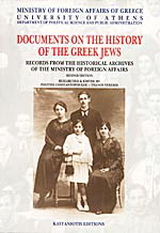Sunday marks the tragic anniversary of the departure, in
1943, of the first train taking members of Thessaloniki’s Jewish community to
the Auschwitz death camp.
Another 17 trains followed, deporting around 55.000 in total
of our Jewish compatriots to a tragic death.
Fortunately, 2.000 survived the Nazi death camps to which they were
dispatched. A lot has been written about how they survived the ghastly
conditions of the concentration camps, particularly at Auschwitz-Birkenau. Only a small number are still alive today,
the serial number tattooed on their left forearm serving as a constant reminder
of the horrors of Holocaust.
On Sunday, amid Russia’s invasion of Ukraine, with the roar
of heavy artillery pounding in Eastern Europe and the risk of full-scale war on
European soil looms, Thessaloniki will hold a so-called “silent march” to the city’s
old railway station, near the waterfront where convoys of Jews were forcefully
rounded up by the Nazi soldiers and sent off to the notorious death camps.
It will be an emotional demonstration against the extermination
of the children of Thessaloniki back then as well as the crimes unfolding today
in Ukraine, in whose capital, Kyiv, the Nazis murdered 33.000 Jews at the Babi
Yar ravine during World War II.
This year’s memorial will be led by the President of Greece,
Mrs. Katerina Sakellaropoulou, who will proclaim the “never gain” vow along with
those who have chosen to forget. It took
more than half a century and a bunch of courageous folks to take the stereotype
and prejudice before the city of Thessaloniki and the Greek state finally paid homage
to its own people.
In 2006, the Holocaust Memorial was moved from Thessaloniki’s
eastern district to Eleftheria (Freedom) Square, It is here that the Germans rounded
up and humiliated the city’s brave Jewish
population before their deportation.
There have been plans of constructing the Holocaust Museum in Thessaloniki
in the western part of the city that was first unveiled by Mayor Yiannis Boutaris in
2013, the museum was originally
scheduled for completion in 2020. It
was only in 2014 that the city extended a formal apology to its Jewish
community through the lips of Boutaris.
“the City of Thessaloniki took an unjustifiable long time to
break the silence, “ Boutaris said. “Today
it can say it is ashamed of those in Thessaloniki who collaborated with the
Germans, those who embezzled fortunes, and those who betrayed the Jews who tried
to escape,” he said.
President Sakellaropoulou’s presence in the front line of the
silent march will confirm that the country has turned the page on this terrible
chapter of its history,
It is will tears flowing from my eyes for the tragic massacre
of my Jewish compatriots during World War II and the extreme shame I am feeling for my treacherous compatriots during the same war, that I am
writing this new post.

No comments:
Post a Comment